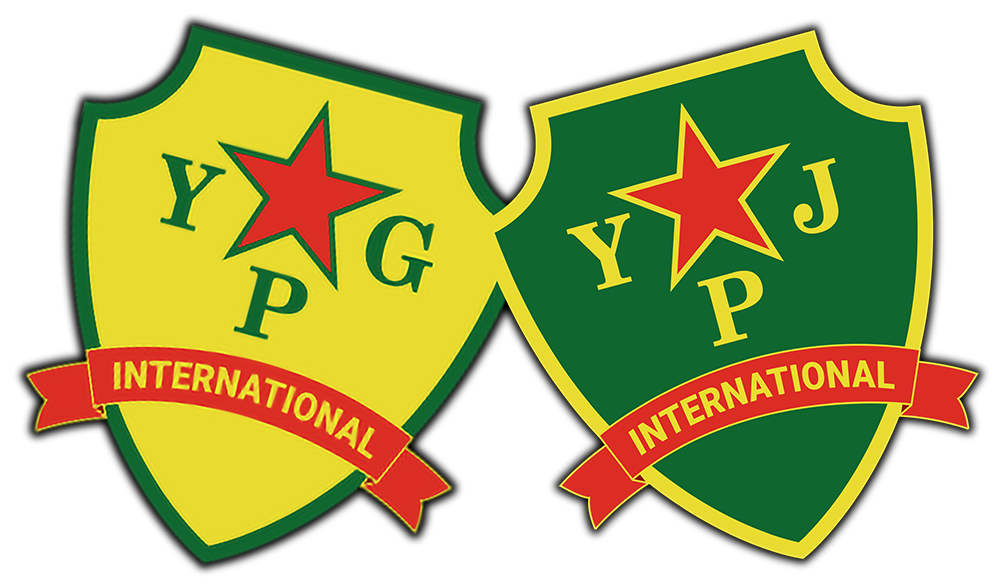Ş. Şoreş Amanos – Ş. Şahîn Qerecox – Ş. Andok Cotkar.
We remember our Şehîds of October
Today we want to commemorate our Martyrs of October – Ş. Şoreş Amanos, Ş. Şahîn Qerecox and Ş. Andok Cotkar.
Jac Holmes was born in Poole, Dorset in 1993. Watching the plague of ISIS fascism spread across Syria and Iraq from a distance, Ş. Şoreş Amanos increasingly felt that he could not sit by and let the atrocities continue while he enjoyed his relatively comfortable life. “It just makes you think: What… am I doing, there are people over there getting blown to pieces everyday, cutting off hands, cutting off heads, forcing people to be sex slaves. I’m just sat here fixing people’s computers or painting people’s walls.” he recalled. His journey to join the YPG was not successful at first. After flying into Erbil he was arrested by the KDP (Kurdistan Democratic Party), who control the government of that part of Iraqi Kurdistan. Due to their collaboration with the Turkish state, the KDP security forces work to prevent internationalists from joining the revolution in Rojava. He was eventually deported back to England. Despite this setback, Jac was undeterred. Only a week later, he made a second attempt, this time arriving in Rojava in January of 2015. There he took on the Kurdish nom-de-guerre Şoreş, which means “revolution”.
After education and being held back from the frontline for a time in order to immerse himself in the language and culture of Kurdistan, he was eager to join the fight against Daesh.He saw his first combat during the operation to liberate Til Hemis. While clearing a village, in his first hour of combat, he was wounded by a gunshot to the arm, and suffered broken ribs, surrounded by Daesh fighters. Showing his courage and commitment to the cause, after surviving this terrifying experience, Heval Şoreş remained undaunted. After the liberation of Til Hemis, he returned to the UK, where he championed the cause of the Rojava Revolution as best he could.
In total, Heval Şoreş came three times to Syria, and participated in some of the most intense campaigns of the War Against Daesh, fighting in Minbic, Tabqa and Raqqa. Şehîd Şoreş was martyred on 23 October 2017 in Raqqa during a mine-clearing operation, when one of the thousands of IEDs left by Daesh in civilian areas exploded, killing him instantly. He had seen the battle for Raqqa through to the very end and fell just four days after the liberation of the city was secured.
Ş. Şahîn Qerecox – Farid Medjahed was born in Marseilles, France. Before coming to Rojava, “Waka”, as he was known by his friends, dedicated much of his life to ecological direct action and anti-capitalist struggle. He took part in frontline eco-defense in the Hambacher Forest occupation in Germany. In Hambacher Forest, eco-defenders had built up various treehouse camps in order to defend the oldgrowth forest, an ecosystem which had lived in this area of the Rhineland since the end of the last Ice Age and is home to significant biodiversity. The forest’s continued existence is threatened by an enormous open-cast coal mining project by energy company RWE. In Pont Valley, England he stood against mining corporations to defend the land, the wildlife, and the people from ecological destruction. He was a well-known and loved figure in the protest camp that was established there. He was also active in the hunt saboteur movement, which engages in direct action to protect the lives of animals from bloodsports. Heval Farid exemplified the internationalist perspective in his approach to eco-defense – he went where he was needed to defend the earth against ecological destruction practice, irrespective of national borders.
“I will never forget his brave actions and efforts fighting for a world he knew was possible,” said one of his comrades who spent time with him on the frontline of ecological direct action. “One free from oppression, patriarchy and ecocide where people live cooperatively in the spirit of mutual aid instead of being made atomised and afraid by capitalism.”
He arrived in Rojava in June of 2018, where he took on the nom-de-guerre “Şahin” (hawk). He was given a command role within YPG International, a reflection of the great trust his friends and comrades had for his abilities and dedication. Şehîd Şahin fought at the frontline in Hajin during Operation Al-Jazeera Storm, the campaign to liberate Deir Ez-Zor. He was martyred on 6 October 2018 during clashes with ISIS. His life was celebrated and his loss mourned at a ceremony at the Center for a Democratic Society in his hometown of Marseille. “His vision and belief in freedom,” said another friend, “led him to join the struggles. He died fighting against the fascism of ISIS, defending the Democratic Confederalist society of Rojava and Kurdistan built on the principles of autonomy and freedom for women, nature and all people. It made sense that Waka’s interest in the intersections of life’s struggles and liberation led him to learn about and defend Democratic Confederalism.” His father said “Farid could have lived a different life if he wanted. He had all the means for that. He became a professor. But he chose to fight for a just world. He could not accept injustice. He valued all human beings. He valued humanity.”
Ş. Andok Cotkar, Konstantin Gedig, was born in Göttingen in Germany. As a young boy, he displayed a great deal of curiosity, intelligence and independence and did not accept injustice. “Konstantin was modest in his personal needs. That striving for material things such as branded clothing was all foreign to him” his parents Ute and Thomas stated. “In search of his place in life, he saw himself more and more as a doer. School didn’t offer him anything anymore.” He decided to pursue a life as a farmer working with animals in the countryside. As he settled in his new life as a farmer, he heard more and more about the atrocities of the Islamic State that were unfolding across Syria and Iraq. His parents recall: “In the end it was the reports, the horrific pictures and the videos about the genocide of the Yazidis, the advance of Daesh and the ISIS atrocities committed that aroused in Konstantin the need to tread other paths.” He was already on the plane to Sulaymaniyah, Iraqi Kurdistan, the first leg of his journey to join the YPG in Rojava when his parents received the message: “I’m trying to help those who can’t flee because they’re being shot on the Turkish border, to help those who decided to stay as well as those who fled to have a place to return.”
Konstantin arrived in Rojava to join the YPG in September of 2016. After his training, he joined the Tactical Medical Unit, a unit made up of many other internationals, which provided frontline medical care for wounded SDF fighters. With the TMU, he participated in combat operations on multiple fronts in Minbic, Raqqa, and Jarabalus, saving the lives of many comrades as a frontline paramedic and passing on lifesaving medical knowledge to his fellow fighters. In Rojava he took the nom-de-guerre Andok Cotkar – Cotkar meaning “farmer”, reflecting his chosen profession.
Heval Andok lost multiple friends during his time fighting in Rojava. His resolve was strengthened when his friends Ş. Robin Agiri (Michael Israel) and Ş. Zana Ciwan (Anton Leschek) were martyred in a Turkish airstrike. He fought in the Tabûr Ivana Hoffmann during the battle to liberate Raqqa. He was wounded multiple times during his time in Rojava. At one point in Raqqa, he was even shot in the head by a sniper, and escaped with only minor injuries due to his helmet. Eventually, in August 2017, he was seriously wounded by a bullet to the hip and was forced to return to Germany for surgery. From the moment he returned, he was clear in his determination to return to the fight, saying “Daesh is still not defeated.” He stayed for about 15 months, and worked and lived from Autumn 2018 to Spring 2019 on a farm in Arpsdorf.
Not content to let the fight continue without him, shortly after his 24th birthday, he returned to Kurdistan and joined the YBŞ International in the mountains of Sinjar, Northern Iraq to defend the Yazidi people against further genocide. Once Turkey launched its invasion of Serêkaniyê on 9 October 2019 Heval Andok quickly volunteered to defend the people from the fascist invasion, arriving on the frontlines with another comrade from YBŞ only two days later. Heval Andok joined with a group known as the group of “deserters”. Of course, they were not deserters, they were fighters who, frustrated with the fact that their units were not taking them to the frontline, decided to make their own way to the fight in Serêkaniyê. Kurds, Arabs and internationalists together, some already wounded and barely recovered, all determined to face the enemy in the most dangerous point in the fighting. One of the group of “deserters” remembers: “ When I looked into his eyes, I could see his willingness to sacrifice his life for this people, for the democratic nation. And he did … He was true to his word.” In a farewell letter to his parents, he had written “Don’t mourn me. I’d much rather be with you than dead. But if I had to make that decision again, I would go fight again. I want you to know that I went into battle happily.” Şehîd Andok was martyred by an turkish airstrike on 16 October 2019 during heavy street fighting in the city.
Şehîd Andok’s mother said at a commemoration in Kiel for her son and other martyrs: “My son was a child who loved sharing. He always meant well. He saw the problem of others as his own, and for this he took his place in the Rojava revolution. He went where he wanted and he was happy there.”
At the time of writing, his body has yet to be recovered from the battlefield, as Serêkaniyê is currently under occupation by the Turkish state and their mercenary gangs. In 2021 the parents of Ş. Andok Cotkar co-signed a letter condemning the invasion and occupation of Serêkaniyê to the German Chancellor Angela Merkel where they wrote “The Turkish state recklessly continues its occupation policy towards Kurdistan, unfortunately, our country is also a partner in this crime.“ “Our children, like all children, made a decision when they became adults. Our children chose to join the struggle to end the injustices against the Kurdish people and we are proud of their decision,” they said. “We want to protect the memories of our martyrs and continue their struggle.”
With their courage, commitment and love for the people and nature, Ş. Şoreş Amanos, Ş. Şahîn Qerecox and Ş. Andok Cotkar became symbols of a new Internationalism. They rest in peace in the hearts of the people of Rojava, who will never forget them and make their dream of a place on earth where there is a free life come true.
ŞEHÎD NAMIRIN!

